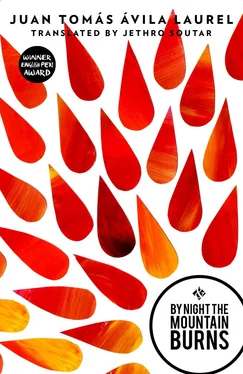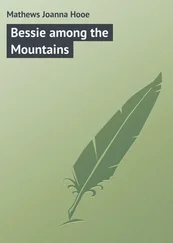Juan Ávila Laurel - By Night the Mountain Burns
Здесь есть возможность читать онлайн «Juan Ávila Laurel - By Night the Mountain Burns» весь текст электронной книги совершенно бесплатно (целиком полную версию без сокращений). В некоторых случаях можно слушать аудио, скачать через торрент в формате fb2 и присутствует краткое содержание. Год выпуска: 2014, Издательство: And Other Stories Publishing, Жанр: Современная проза, на английском языке. Описание произведения, (предисловие) а так же отзывы посетителей доступны на портале библиотеки ЛибКат.
- Название:By Night the Mountain Burns
- Автор:
- Издательство:And Other Stories Publishing
- Жанр:
- Год:2014
- ISBN:нет данных
- Рейтинг книги:5 / 5. Голосов: 1
-
Избранное:Добавить в избранное
- Отзывы:
-
Ваша оценка:
- 100
- 1
- 2
- 3
- 4
- 5
By Night the Mountain Burns: краткое содержание, описание и аннотация
Предлагаем к чтению аннотацию, описание, краткое содержание или предисловие (зависит от того, что написал сам автор книги «By Night the Mountain Burns»). Если вы не нашли необходимую информацию о книге — напишите в комментариях, мы постараемся отыскать её.
By Night the Mountain Burns — читать онлайн бесплатно полную книгу (весь текст) целиком
Ниже представлен текст книги, разбитый по страницам. Система сохранения места последней прочитанной страницы, позволяет с удобством читать онлайн бесплатно книгу «By Night the Mountain Burns», без необходимости каждый раз заново искать на чём Вы остановились. Поставьте закладку, и сможете в любой момент перейти на страницу, на которой закончили чтение.
Интервал:
Закладка:
In the period I’m talking about, those who had someone to go out fishing ate fish, and those who had nylon and hooks went out fishing. So the lack of fish was considerable in some families. We longed for the big fish to chase the little fish and for them all to fling themselves on the sand, as we’d seen happen so many times before. And we longed for the squid beaching, that it might become a weekly event. And if we longed for such miracles, which is basically what they were, for it’s quite something to have fish flung at your feet, it was because our situation had become desperate. And it was during those desperate times that the extraordinary events I mentioned began to occur. All the evil came at once. The worst moments in the history of the island.
With the shortage of everything really squeezing at our throats, a boat appeared off the coast, and it was so close that we could tell it was taking fish from our larder, our sea. And so out we went, for we had something to say about this. But it turned out to be a boat from a friendly nation, stealing fish because it knew our island belonged to no one. Or rather that it belonged to us, but that we had no control over it. And we didn’t say anything about what they were doing, for every man’s conscience is his own, but we gave them a list of things we needed. This was it: soap, kerosene, matches and food. We didn’t ask for clothing because there was no need to say we lacked things to wear. But do you know what those men gave us? Cigarettes and fish. So many they wouldn’t fit in the canoes our men had gone out to the boat in. Can you believe it? They gave us cigarettes and fish. It was therefore clear that the owners of the boat from the friendly nation knew the fish were ours and wished to share them with us. And what about the tobacco? Our men had an unhealthy yearning for it, because for a long time they’d been reduced to smoking papaya leaves. So the men came back from the boat and no one can say things weren’t shared out evenly: fish for the women, tobacco for the men. In fact hardly any women on the island smoked, though a few of the older ones did something similar, chewing it and stuffing it in their gums. But only a few of them, and they never used it as snuff.
When they saw all that fish and tobacco, some people thought we could maybe have done better, that fish and tobacco wasn’t exactly what we needed most. So it was decided it would be a good idea if the women went to ask for themselves, because if the men on the boat saw the women and talked to them, then things would doubtless change for the better. That’s right, for the better. The problem was that the women on our island didn’t know how to paddle — they still don’t — and so they had to be taken out to the boat to talk to the white men. I remember one of the women told me … No, nobody told me anything. The result of the deal the women struck with the white men was the arrival on our island — not in the canoes that the women were taken out in, but in the big boat’s fishing vessels — of everything the women felt we lacked in that terrible time of shortages: soap, kerosene, salt, clothes, shoes, matches, a variety of things to eat, fish and cigarettes, and alcoholic drinks. There were several containers of soap powder, which was good because it meant people could take a handful for themselves and everyone left happy. The same thing with the salt, because most of it was unrefined. The alcohol and tobacco caused a great furore among the men, and one or two of the women too, it has to be said. A few people were lucky enough to get a shirt; others made do with seeing someone they knew take one away. The products that stretched the furthest were the fish, the salt and various things for making fire. And the alcohol, which spreads fast. Perhaps due to its flammable nature.
The time came for the boat to up anchor. Months went by and the things we got from the friendly nation’s fishing boat ran out. One of the women who had been to talk to the white men was the goddaughter of that man we thought had always been on the island and who was friendly with our grandfather. It so happened that this man, who I’m not sure we didn’t confuse with somebody else, had been not to the place where our fathers were — the place you went to in a boat full of hens and cockerels and other edible things, donated by our grandmother and other women from the island — but somewhere else: Calabar. And there were Igbos in Calabar and they were people who ate other people. We were told you had to be very careful with Calabarians. Well, that friend of grandfather’s was a bit of a joker, among other things, and he let it be understood by everyone on the island that he’d been to Calabar and knew things about the people who lived there. In fact he sometimes talked the way people from Calabar talked and he founded an association of people who danced at Christmas dressed the way Calabarians dress, and talked the way men who liked eating other men talked. Anyway, his goddaughter took part in the expedition to the boat, where the women went to see those white men and talked to them so well they reached an understanding. And the fruit of that understanding was the growth of that girl’s belly, a growth that remained even when everything else from that expedition of understanding had run out. In fact not everyone knew that her belly was growing, nor did they know that the growth was a result of her having talked to, or with, the white men on the boat. But her belly went on growing and people gradually found out that she was expecting a child and that the child would be the son of a white man, and that only she knew who he was because the liaison on the boat had taken place out of sight of everyone else in the village. She was a goddaughter, it’s true, but she lived with her sister, the person she was closest to in life. Her parents had died a long time ago, back when nobody could imagine that one day we’d find ourselves in this situation.
The days went by and the island gradually went back to being gripped by shortages, and then something happened that frightened everybody. In fact all the wicked things started to happen, as if they’d been lining up, waiting their turn. The first thing was that a woman and her sister set off up the Pico carrying a piece of smoking kindling. They were going to their plantations in the mountain’s foothills, next to a lake — Lake Nosopay. The lake and the mountain look like they’re side by side when viewed from a certain angle, but really they lie on different planes and are not that close together at all. The mountain, the Pico, or el Pico de Fuego , to give it its full Spanish name, looks down on everything else, defiant and proud, and at its feet, as if asleep, lies Nosopay, the lake. Nosopay is also the name given to the flat plateau above, from where you catch a sudden glimpse of the lake down below when the plateau breaks off into a sharp precipice. You look out into a void and see the lake in a vast bowl at the bottom, its water disturbed only by a gentle breeze.
So the two sisters set off towards Nosopay carrying a piece of smoking kindling, for they planned to make a fire up there, at the base of a dried-out tree they wanted to fell and use as firewood. If they’d been more agile, or if they’d been born men rather than women, they’d have climbed the dried-out tree with axes and chopped it down, bit by bit, branch by branch, for a tree gives firewood for many months, many, many months. But they didn’t have axes, or they didn’t have the dexterity to use them, and they’d been born women. And back then there weren’t enough men on the island for all the undexterous women. Which was why the two sisters resorted to fire, burning through the base of the tree instead of cutting through it. Furthermore, by making a fire on that plantation of theirs, they could pull a yam from the ground and leave it to cook in the embers, giving them something to fill their stomachs with while they worked. So they made the fire and got stuck into their tasks. They worked from the moment the sun poked its nose over the horizon until they felt they’d done enough, when they stopped and straightened their backs; it was time to go round the plantation with the basket to collect all the yam and cassava they’d pulled up, the fruits of their labour of a few months ago, plus any bits of cane they’d cut down while searching for the yam and cassava. On that Atlantic Ocean island, harvesting was something you did day in, day out, for no one had an area of land large enough to harvest everything all at once, at least not a harvest big enough to keep the whole family from hardship. When those two sisters finally straightened their backs, it was just a few hours until sunset, but the king of stars was nowhere to be seen due to the thick clouds of smoke.
Читать дальшеИнтервал:
Закладка:
Похожие книги на «By Night the Mountain Burns»
Представляем Вашему вниманию похожие книги на «By Night the Mountain Burns» списком для выбора. Мы отобрали схожую по названию и смыслу литературу в надежде предоставить читателям больше вариантов отыскать новые, интересные, ещё непрочитанные произведения.
Обсуждение, отзывы о книге «By Night the Mountain Burns» и просто собственные мнения читателей. Оставьте ваши комментарии, напишите, что Вы думаете о произведении, его смысле или главных героях. Укажите что конкретно понравилось, а что нет, и почему Вы так считаете.












